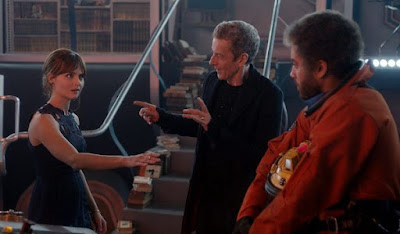Another
year, another Oscars. The awards were a
mixed bag for me – some predictable wins and a few upsets, some well-deserved
(in my opinion) wins and a few that bugged me – but the ceremony itself had
plenty of intriguing moments to keep my interest.
I was
thrilled that Mad Max: Fury Road cleaned up in the design and
technical categories, taking home six awards (the most of any film that
night.) Even though it didn’t get any of
the “big” stuff, I’m glad the Academy actually recognized how wonderful it
is. The only problem with the sweep was
that it got my hopes up that George Miller might beat out Alejandro González
Iñárritu for best director. No luck,
sadly. However, just as I was resigning
myself to The Revenant winning best
picture, Spotlight swooped in to save
the day! Very happy for Tom McCarthy and
everyone behind that movie. It was a
little odd that it only won one other award it was up for (best original screenplay,)
but it felt gratifying to me that the film deemed to have the best story was
also the film given the top honor. The Big Short’s win for best adapted
screenplay made me happy as well, and as for cinematography, I’m a little
bowled over that Emmanuel Lubezki (The
Revenant) got his third Oscar in a row. When that streak ended, it really ended!
The
acting categories went three-for-four as I expected. Mark Rylance winning best supporting actor
for Bridge of Spies shocked me – I’d
thought Stallone had it in the bag. I
was most happy for Brie Larson getting the lead actress trophy. Even though that win was in no way a
surprise, it was for very good reason.
Although I anticipated Alicia Vikander taking best supporting actress, I
still don’t like the fact that she won for a very obvious co-lead role. And Leonardo DiCaprio… Good on him for finally
nabbing that Oscar, but it’s disappointing to me that it was for The Revenant. I just didn’t think that film provided him
with a good showcase for his talents at all.
I
enjoyed Chris Rock as the host, and while I figured he wouldn’t avoid the
#OscarsSoWhite controversy, it surprised me how heavily the ceremony centered
around it. It was the focus of the whole
monologue (which, for me, veered occasionally into attempts to absolving the
Academy on the issue because there are “more important things” to worry about,
but which also made some good, cutting points,) and there were numerous bits
addressing diversity in Hollywood. I
particularly liked the “Black actors inserted into best picture nominees” clips,
an amusing “history lesson” with Angela Bassett, and Rock’s man-on-the-street
interviews with theatergoers outside a Compton cinema. Others onstage, from presenters to winners to
the Academy president, also brought up the importance of inclusion, although I
don’t recall anyone white taking part in those statements. One thing that bothered me in the
#OscarsSoWhite remarks was how consistently it was framed as #OscarsNotBlack, when no actors of color were recognized.
I realize that most of the specific snubs called out this year were
Black actors (or directors, in Ryan Coogler and F. Gary Gray’s cases,) and in
general, I think other acting communities of color are at a different stage in
their fight for representation in Hollywood, but it still felt weird that
hardly anyone recognized it as more than a Black issue. However, I love that Rock made opportunity a major
focus; his rueful comment to Leonardo DiCaprio about Leo being “in a great
movie every year” highlighted the
imbalance in a pretty striking way.




